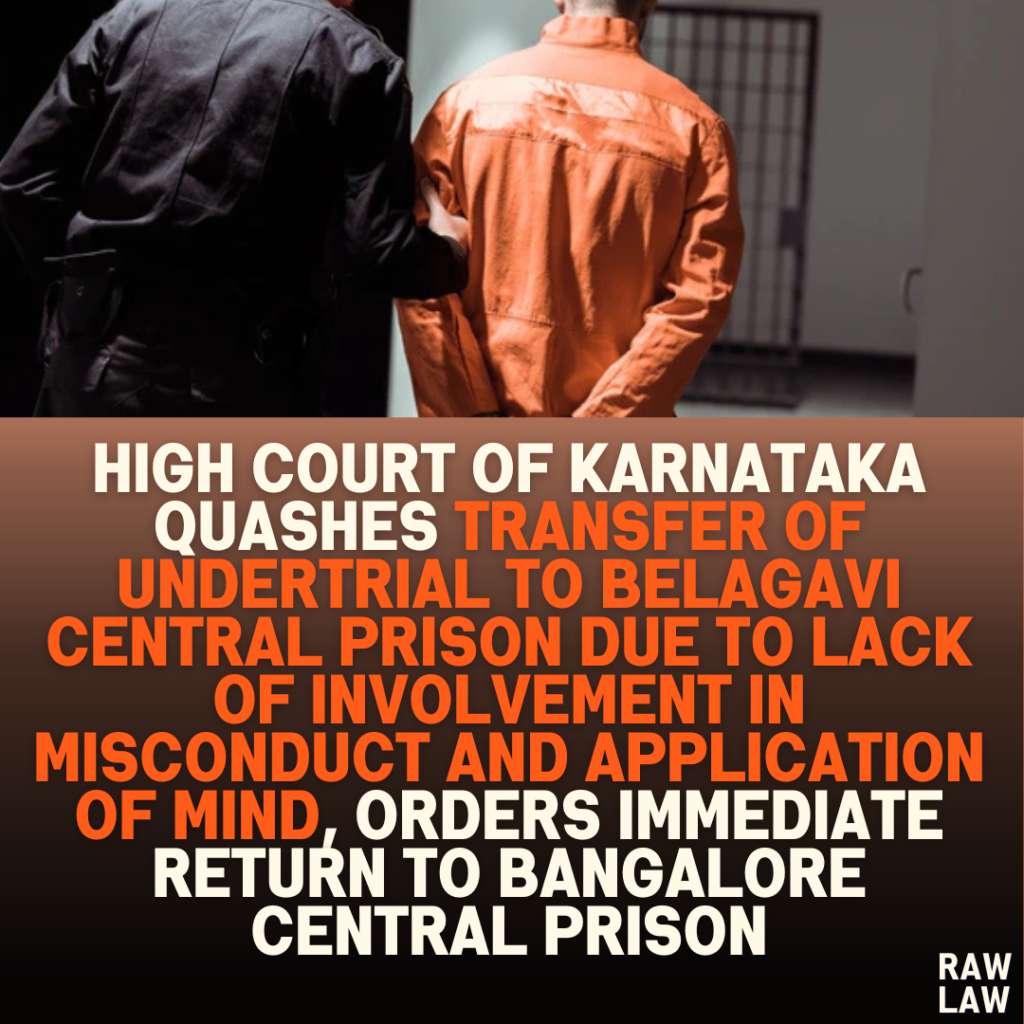Court’s Decision: The High Court of Karnataka, in its decision dated 1st October 2024, quashed the transfer order of the petitioner, an undertrial prisoner, from Bangalore Central Prison to Belagavi Central Prison. The court found that the transfer was carried out without proper consideration and violated the principles of fairness. The court directed that the petitioner be shifted back to Bangalore Central Prison immediately, noting that the order did not apply to other accused in the same case.
Facts: The petitioner was one of the accused in Crime No. 250/2024, registered for offenses under Sections 302 and 201 of the Indian Penal Code. The petitioner was arrested and remanded to judicial custody. The issue arose when the jail authorities submitted a requisition for transferring several accused, including the petitioner, to different prisons across Karnataka. This transfer request was prompted by media reports showing one of the co-accused, Darshan, in questionable company while in prison, sparking concerns about the influence on witnesses and potential misconduct within the prison.
The petitioner, however, was not involved in the reported misconduct and contended that his transfer was unwarranted. He also raised concerns of mistreatment, claiming he was housed in a dark Andheri Cell and subjected to excessive surveillance.
Issues:
- Whether the transfer of the petitioner to a different prison was justified.
- Whether the petitioner’s rights were violated due to the transfer and the conditions of his confinement.
Petitioner’s Arguments: The petitioner argued that he was not involved in the alleged misconduct of his co-accused and that the transfer order was passed without any application of mind. He also highlighted the inhumane conditions of his confinement in the Andheri Cell and claimed that the transfer had no valid basis, as he had no direct involvement in the activities of the co-accused.
Respondent’s Arguments: The State Public Prosecutor defended the transfer, asserting that it was necessary to maintain discipline in the prison and to prevent any undue influence on witnesses. The prosecution claimed that the petitioner, like others, needed to be shifted as part of a larger plan to disperse undertrial prisoners involved in the same case.
Analysis of the Law: The court referred to principles of fair treatment of undertrial prisoners, emphasizing that shifting a prisoner must be based on proper grounds and cannot be done arbitrarily. The court examined precedents, including the Supreme Court’s decision in State of Maharashtra v. Saeed Sohail Sheikh, which highlighted the judicial nature of transfer orders and the necessity of applying judicial discretion.
Precedent Analysis: The court relied on the Supreme Court’s decision in State of Maharashtra v. Saeed Sohail Sheikh, where it was held that any transfer order affecting an undertrial prisoner must be passed after careful consideration and cannot be a mere administrative decision. The court emphasized that prisoners have the right to defend themselves, and their transfers should not isolate them from their legal rights and family support.
Court’s Reasoning: The court found that the magistrate’s order lacked the necessary application of mind, as the petitioner’s involvement in the misconduct was not established. The petitioner was housed in a separate cell and had no connection to the co-accused’s activities. The court observed that transferring the petitioner without a valid reason violated his rights as an undertrial prisoner.
Conclusion: The court quashed the transfer order dated 27th August 2024, issued by the XXIV Additional Chief Judicial Magistrate, Bengaluru, regarding the petitioner. It directed that the petitioner be immediately transferred back to Bangalore Central Prison, ensuring that the decision applied solely to the petitioner and not to the other accused.
Implications: The judgment reinforces the need for judicial scrutiny in decisions involving the transfer of undertrial prisoners. It emphasizes that administrative convenience cannot override the rights of prisoners, especially when the transfer could lead to further hardship. The court’s ruling upholds the importance of fairness and reasoned decision-making in the treatment of undertrial prisoners.




Pingback: Delhi High Court Dismisses Appeal, Upholds Plaintiff’s Possession Rights in Property Dispute Based on Oral Settlement and Co-ownership Without Partition Decree, Orders ₹10,000 Monthly Damages for Delay - Raw Law
Pingback: Supreme Court Directs Refund with 6% Interest to Auction Purchaser for Delay in Rs. 81,20,000 Refund; Modifies High Court Order and Sets Aside 5% Compensation - Raw Law